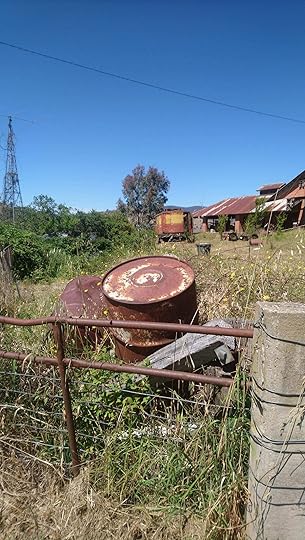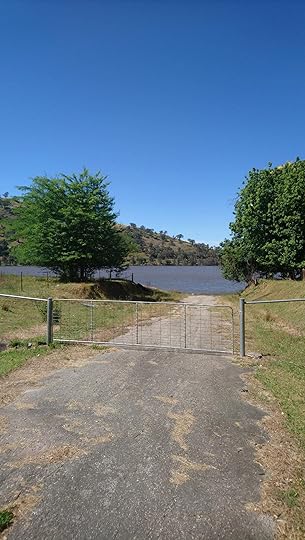Tallangatta
Before I start writing I hear the story of four boys who have died in the United States, fallen through river ice, cardiac arrest; and a neuroscientist facing his own mortality, two or three days before the cancer he understands so well (at the genetic, the cellular level) carries him off on the Great Adventure; the fear of losing loved ones, daily, hanging over our heads, the realisation time has nothing to do with you – you’re part of it, in it, but it continues despite any understanding, intuition, feelings of love, desire, empathy – sits waiting, and why should you be any different to the forty people who stood in your place before this moment? Once understood, and accepted, everything follows. A cloud seeded with everyone who’s ever lived, falling through time’s long ruin, gathered in some mystical, mythical place full of weeping grass and bluebells. If that’s how we want to imagine it, and why not? The idea that there’s no thought you’ve had that hasn’t been had; no frustration, no contempt, no desire, no shame that had to be hidden in the deepest, safest part of your brainbox. No poem that hasn’t been written, combination of notes making songs sung on cold, windy Burren days thousands of years ago; no insights into others’ behaviour, no overlooked solutions. You, simply, have been thrown into an unwinnable football match, probably because of a lack of players, destined to chase a small, soggy ball.
I think of the piece I thought of writing, describing the small town of Tallangatta. The town that was. On the day I visit, old Tallangatta sits under gigalitres of water, thirty, forty metres down, the main street all sludge, the Soldiers’ Memorial Hall and Free Library, Pink Bros. General Merchants, the billy buttons and club rush, drowned, in the name of 1950s progress. The coffee palace and cordial factory; the lusty, Methodist church and pig sale yard. And what of this place I can’t see, but stand at the end of Martha’s Lane imagining? The water lapping at my feet, inviting me to wade in, explore, some Tourism Victoria Experience sold to city folk, and here I am, disappointed. Think of yesterday, of this town, the four boys, the flooded graveyard, the long-abandoned six o’clock swill at the Victoria Hotel, Jock Cavanagh explaining how, as a boy, he and his mates crawled under the jacked-up weatherboard houses (to be moved a few miles down the road) looking for pennies and pounds and marbles. Spent his summer fishing for redfin in Tallangatta Creek, and now there’s no creek, no town, nothing but the Hume Weir and a body of water the size of seven Sydney Harbours, a safe, dependable supply of irrigation water that came at the cost of a small, Australian town.

This, then, is the old town, the town of Tallangatta, an Australian Brigadoon that only emerges in drought years. In the form of a few houses left behind at the time of the government relocation (1952-1954) because they’d been built on high ground (the ‘Toorak’ of Tallangatta). The butter factory with its rusted roof, its yard overgrown with river mint and pigface, old machinery and an abandoned car, the memory of milk, churn, butter, bread, Jock at the dinner table and Pappa says dear Lord, thank you for what you’ve given us, but soon their house, minus its outdoor dunny and rows of carrots and tomatoes and its toolshed full of rusted hammers and nails and the spot where Bob emptied the dripping from the roast and the bough-hung swings, floating beside Aunty Noreen’s bleached bones, windows in the school house where kids stared out at clouds (their Pythagorean ghosts marvelling at carp and cod), all jacked up and de-stumped, loaded onto the back of a truck and taken to the ‘new town’ (the old town of Bolga) a few miles away, placed on a numbered site ready to start again.
Post-World War I, the need for reliable irrigation water, the use of the Returned to build the Hume Weir, an engineering feat that, to this day, impresses. Water to the horizon, speed boats and catamarans playing in the silver-tipped waves, then heavy, prolonged rains, the weir gates opening, the bloated Murray flooding. But even then, it was obvious the weir could hold more, promise greater wealth, alluvial plains and beets and lettuces and fat angus and shorthorns to feed the Commonwealth. And already, by the 1930s, a discussion about increasing the weir’s capacity. Problem being, Tallangatta, built in the bottom of a low-lying valley, the annual floods, the winter fogs that lasted until one in the afternoon, this unremarkable town that had started off as a series of cattle runs in the 1830s, an 1854 foundation-stone, the Indigenous name Tallangatta (‘place of many trees’) borrowed from the local Pallanganmiddang and Dhudhuroa people. And from the outset, there were concerns. The usual drought and fires, but mostly the annual floods, so bad the council built a shed to store boats so people could get up and down the main street after heavy rains. The horses were used to getting around girth-deep in the mud. This, everyone agreed, was what came from building in a valley.
I stop beside the highway, look across the flooded valley, read the sign saying this is where Tallangatta used to be. A feat of imagination, although an old bridge still exists, taking the ghosts from nowhere to somewhere – wedding, funerals and wakes for Clarry and Eunice, Bown’s main street Draper, chiffon curtains and a doily for Edna’s phonograph. Once – down deep in this submarine city, this wattle-and-daub Atlantis, a thousand miles from the closest coast – you could visit T.J. Brazill, baker, for a cob loaf, sound the fire alarm if you saw or smelt smoke. Now, just double-glazed visions of the past and the memories we grant it, the names we choose to remember, a glossy, brochure-perfect landscape with bald hills (cleared for firewood, willows for stock in drought years) and sheoaks on the high ground, river reds with their feet in the liminal zone, drinking the murky water in wet years, storing it for the dry, yam daisy and native lilies and an old pre-flood oak surviving beside one of the few houses left in ‘Toorak’ (the wealthy of the Australian regions always built their homes near the hospital on the high ground, anticipating the vagaries of climate, and history).
A road crew in a truck pull up and park in the lookout, search their phones for messages, sit in the cab and eat sandwiches. Meanwhile, the ghosts are busy – the wind working at a chocolate wrapper caught in the wire fence (although the Kit Kat isn’t going anywhere); a warm day, the frustrations and desires of the old townfolk almost audible through the needles of a nearby pine. As I read the usual interpretive panels, fading, just like the memory of whatever happened below these waters seventy years ago. Friday night, the men from H. H. Goodwin filling the pub for six o’ clock swill, their kids waiting outside, lemon squash and bikes made from bits and pieces of older bikes, and older bikes, this churn of life, of love, of routine like it always had been, and would be, amen.

Four boys dead, but only two fell through the ice, and the others went to save them. Like, in numbers, things would be better, like whatever happened in the world that day happened here, whatever thoughts and feelings and pain and horror as they reached for the surface, for the sun, for the voices above them. But our capacity, as a species, for moving on, is enormous. Like the living and the dead have an understanding, and anyone who can hear the old people calling can hear what they’re calling.
After the town was moved – lines on a map, lots drawn, sewers laid, gardens planted, concrete footpaths – there was a sense of unease: that, for all its newness, its water tanks and reliable electricity, this place didn’t add up to what they’d left. Still, these were tough, reliable people, used to hard times, wars, nothing phased them, except perhaps a loss of history and belonging, lives dislocated in much the same way as the local Aboriginal people. Something about roots, lifting a house on the back of a truck and taking it elsewhere, temporary nomads demolishing red-brick pubs and shops and replacing them with neat, asbestos-trimmed laundromats and shire halls. No more fishing or swimming in the river; no more selling mushrooms to the Myrtle Café (‘Three Course Meal a Specialty’). With the end of the old town came the stripping away, the loss of old connections, of shops with a house out back, smoked sausages and pickled onions in clay pots, the day Mary Fraser locked the visiting magistrate in his hotel room; the Oddfellows used for art displays, reading circles, crocheted rugs as a way of dealing with the loss of sons in the Great War.
I couldn’t have come at a worst time: the tail-end of a wet winter dragging its arse into October, November, December. The Hume was up, no signs of old Tallangatta. So I stopped my car short of the submerged town, walked to the water’s edge, and listened. Nothing except a striped skink on a rock, fat exhausts from motorbikes on the highway – steamy days, the walk to town (no one could afford a car), sleep-outs full of stray uncles who spent their days listening to the races. But the new place would be just as good, better. It’d all be done properly – everything surveyed, paid for, and if you didn’t get your first choice, then your second, your third. Of course, the usual claims of favouritism, committees stacked with local businessmen, who got the best shop on the main street? A hundred houses lifted between 1954 and 1956, 37 new homes, birches and elms planted in civic parks to replace swamp paperbarks and tea-tree that’d lined the river for millennia. Dunnarts and bandicoots replaced with Jack Russels and cats, Aboriginal songlines with Leave it to Beaver (fine-tuned in the after-school haze, blue gum skies full of smoke from stubble burns), bent-wing bats with budgerigars, sugar gliders with rats and rabbits and fallow deer introduced by well-meaning Acclimatisation Societies. Change the only certainty. Television ads for labour-saving devices promised a more civilised existence. A machine to dry your clothes. A Holden. A petrol station to ensure you were never stranded.
One day I’ll go back to old Tallangatta. I’ll wait for a long drought. For the waters to recede and the streets to emerge. I’ll walk the main strip; I’ll stop in front of the Victoria Hotel and listen to the voices in the front bar, kids calling for dad to come home, mum wants you, she’s pretty pissed off. Jock will be there, eight years old, and the Grade six kid his mother gave two shillings a week to dinky him to school. A bank, the manager with poppy oil in his hair, who’ll know the name of everyone’s kids. The cinema that started with Fred Astaire and finished with James Dean, the popcorn, the worn carpet along the aisles. I’ll listen to the conversations about the new maths teacher and Harry’s bulging disk and the rumours the government wants to move us all, but they’ll carry me out in a box before that. On a cold morning, the boys running down to the creek, and in they go, and this gyre, this churn, this cycle continuing until the next rains, more water and we’ll wait another thirty years to remember who we were, and are. But we’ll hear the voices calling; listen, and make out what they say, and realise they know our names.
Stephen Orr's Blog
- Stephen Orr's profile
- 31 followers



